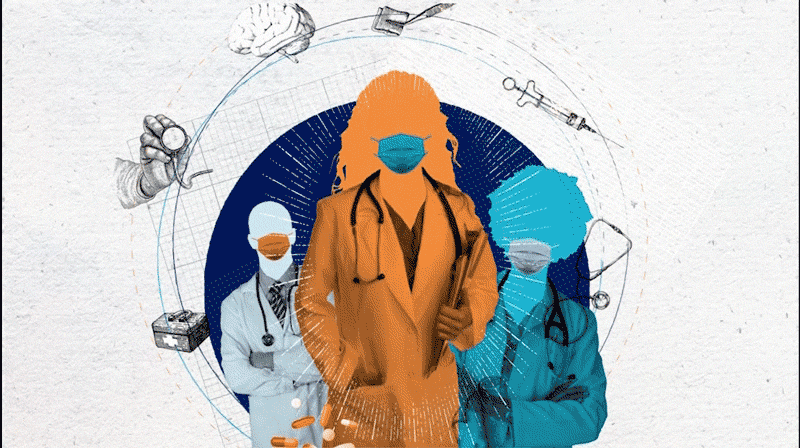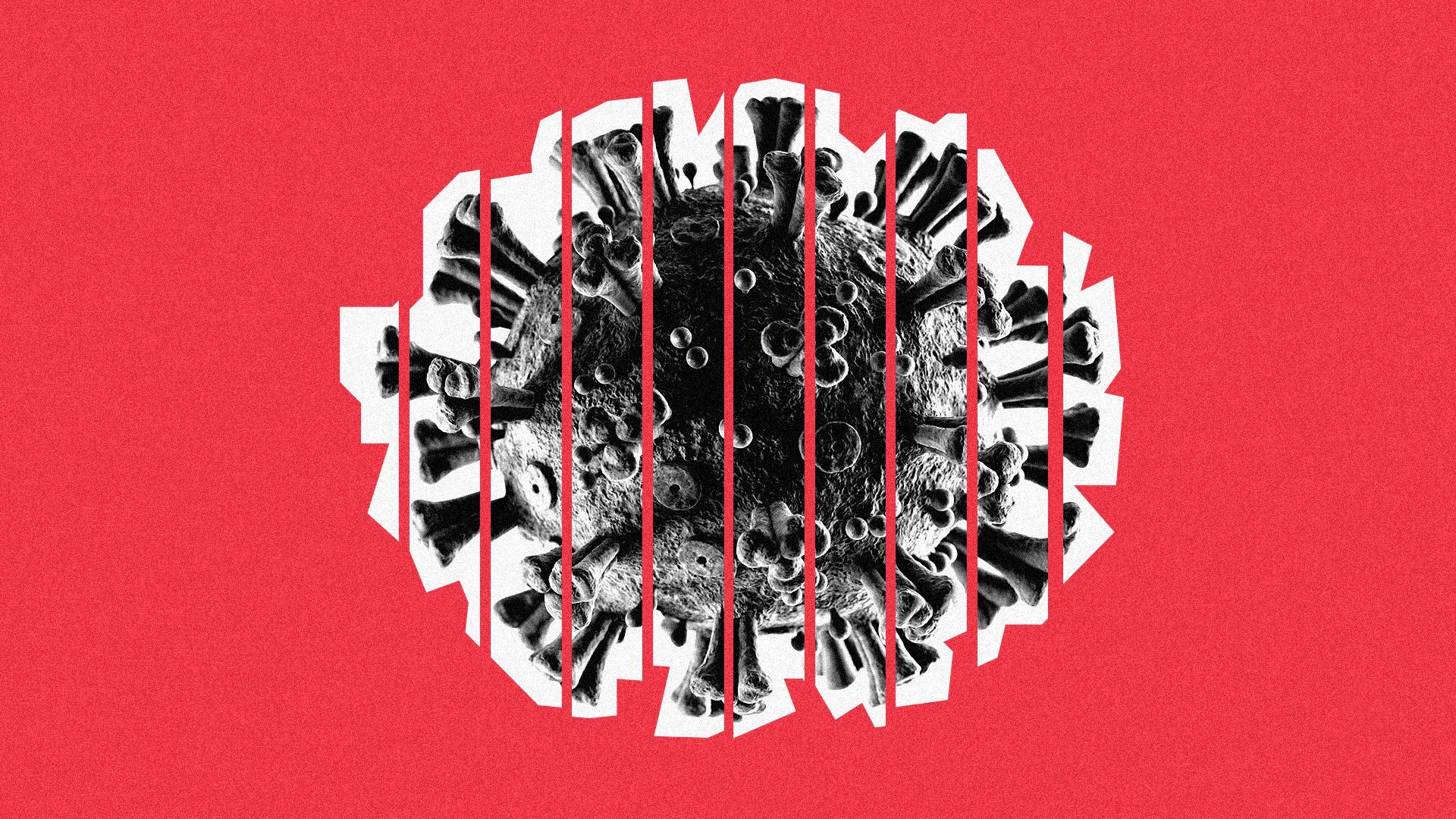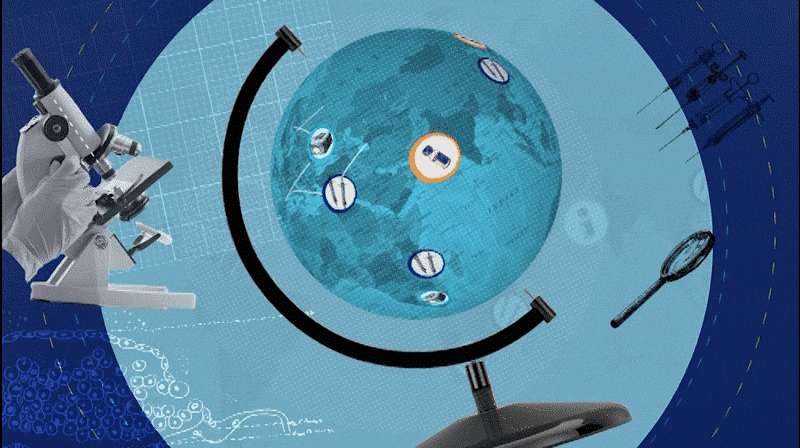1 big thing: Masks work | Wednesday, October 28, 2020
| | | | | | | Presented By PhRMA | | | | Vitals | | By Caitlin Owens ·Oct 28, 2020 | | Good morning. Today's word count is 808, or a 3-minute read. | | | | | | 1 big thing: Masks work |  | | | Illustration: Sarah Grillo/Axios | | | | Coronavirus hospitalizations are rising much more dramatically in places that don't require people to wear a face mask, Axios' Sam Baker reports. Hospitalizations are up across the board. But they're rising far more modestly in places that require masks, according to a Vanderbilt University analysis that compares Tennessee hospitals based on how many of their patients come from counties with mask requirements. - In hospitals where at least 75% of patients are subject to a local mask requirement, COVID hospitalizations are at about the same level now as they were July 1.
- In hospitals where fewer than 25% of patients are subject to a local mask mandate, however, hospitalizations are more than 200% higher than their July 1 levels.
Where it stands: Roughly 43,000 people are in the hospital right now for coronavirus infections, according to the COVID Tracking Project. - Many states are seeing more hospitalizations now than they have at any other point in the pandemic, and some localized areas are beginning to worry about running out of beds.
The bottom line: Masks are not a silver bullet; nothing is. As the Vanderbilt analysis notes, places with mask mandates may also see better adherence to other safety measures, including social distancing. - This is one more piece of evidence that those interventions work. They reduce the risk of transmitting the virus at all, and may reduce the risk of serious illness when some transmission does occur.
Share this story. |     | | | | | | 2. The testing windfall |  Data: Yahoo; Chart: Axios Visuals The sustained coronavirus pandemic is leading to especially large windfalls for labs and companies that make the materials used for testing, Axios' Bob Herman reports. The big picture: Detecting widespread infection and helping set up clinical trials isn't free, and the botched federal response will keep demand for these supplies high for a long time. By the numbers: Investors in companies directly involved with coronavirus testing are starting to reap their largest rewards six months into the pandemic. - Thermo Fisher, which makes test kits, reagents and materials used in vaccine and coronavirus drug trials, said third-quarter profit more than doubled compared to last year, reaching $1.9 billion. Revenue soared 36% to $8.5 billion. More than 20% of its revenue was tied to COVID-19 tests, equipment and services.
- LabCorp said its third-quarter earnings more than tripled as COVID-19 test demand continued to surge and other routine lab tests started to come back.
- Quest Diagnostics also said its profit doubled.
What they're saying: "We're on track to achieve a truly spectacular year," Thermo Fisher CEO Marc Casper told Wall Street this week after the company raised its full-year revenue and profit projections by 14% and 35%, respectively. "It's exciting to be able to set a new bar on performance, right?" |     | | | | | | 3. Some survivors have "autoantibodies" | | Some coronavirus survivors' immune systems may be producing antibodies that are attacking their bodies, the New York Times reports. Why it matters: This may make severe coronavirus cases worse, and also may help explain why some patients suffer symptoms for months after being infected. Details: These patients' immune systems have shifted from attacking the virus to attacking themselves — which is similar to what happens with diseases like lupus and rheumatoid arthritis. - The patients are producing "autoantibodies," which target genetic material from human cells rather than the virus.
- The study has not been published in a scientific journal.
- "Anytime you have that combination of inflammation and cell death, there is the potential for autoimmune disease and autoantibodies, more importantly, to emerge," Marion Pepper, an immunologist at the University of Washington, told NYT.
What's next: Doctors could use existing tests to find patients with autoantibodies, who may benefit from treatments used by lupus and rheumatoid arthritis patients. |     | | | | | | A message from PhRMA | | The key to developing more – and more affordable – medicines | | |  | | | | One reason so many COVID-19 vaccine candidates are in late stage clinical trials is because companies are able to share information around vaccine technology. Our IP system – including patents – provide scientists with information that leads to more options for all kinds of treatments. | | | | | | 4. Paying people to stay sober hasn't caught on | | People with a drug addiction, particularly to stimulants like cocaine and methamphetamine, often can't access a treatment regimen called contingency management, despite evidence that it works, the New York Times reports. The big picture: The program is only offered within the Department of Veterans Affairs or in research clinics. It rewards participants with prizes, sometimes including randomized payments between $1 and $100, as long as they stay clean. Yes, but: Some organizations and researchers morally oppose the idea of rewarding someone for staying off drugs — one reason Medicaid does not cover the treatment, Axios' Marisa Fernandez writes. - People have less success staying abstinent after the treatment ends, evidence suggests.
- There's also a chance participants could use the money to relapse.
Why it matters: Supporters of the program want to expand it, especially as overdose deaths involving meth have soared in recent years and in the absence of a safe drug that can help ease cravings, like methadone can for opioid addiction. |     | | | | | | 5. Catch up quick |  | | | Illustration: Aïda Amer/Axios | | | | U.S. coronavirus cases and hospitalizations are surging, with cold weather arriving before even the best-case scenario for a widely distributed vaccine. Now we're also beginning to see an increase in coronavirus-related startup funding, focused on both testing and pharma, Axios' Dan Primack reports. Former President Obama launched an attack on President Trump while campaigning for Joe Biden in Orlando on Tuesday, criticizing Trump for complaining about the pandemic as cases soar and joking that he's "jealous of COVID's media coverage." Russian President Vladimir Putin on Tuesday instituted a nationwide mask mandate, as the nation tries to combat a second spike of COVID-19 cases, according to an order published by Rospotrebnadzor, the federal health watchdog agency. |     | | | | | | A message from PhRMA | | The key to developing more – and more affordable – medicines | | |  | | | | One reason so many COVID-19 vaccine candidates are in late stage clinical trials is because companies are able to share information around vaccine technology. Our IP system – including patents – provide scientists with information that leads to more options for all kinds of treatments. | | | | | | Axios thanks our partners for supporting our newsletters.
Sponsorship has no influence on editorial content. Axios, 3100 Clarendon Blvd, Suite 1300, Arlington VA 22201 | | | You received this email because you signed up for newsletters from Axios.
Change your preferences or unsubscribe here. | | | Was this email forwarded to you?
Sign up now to get Axios in your inbox. | | | | Follow Axios on social media:    | | | | | |






No comments:
Post a Comment